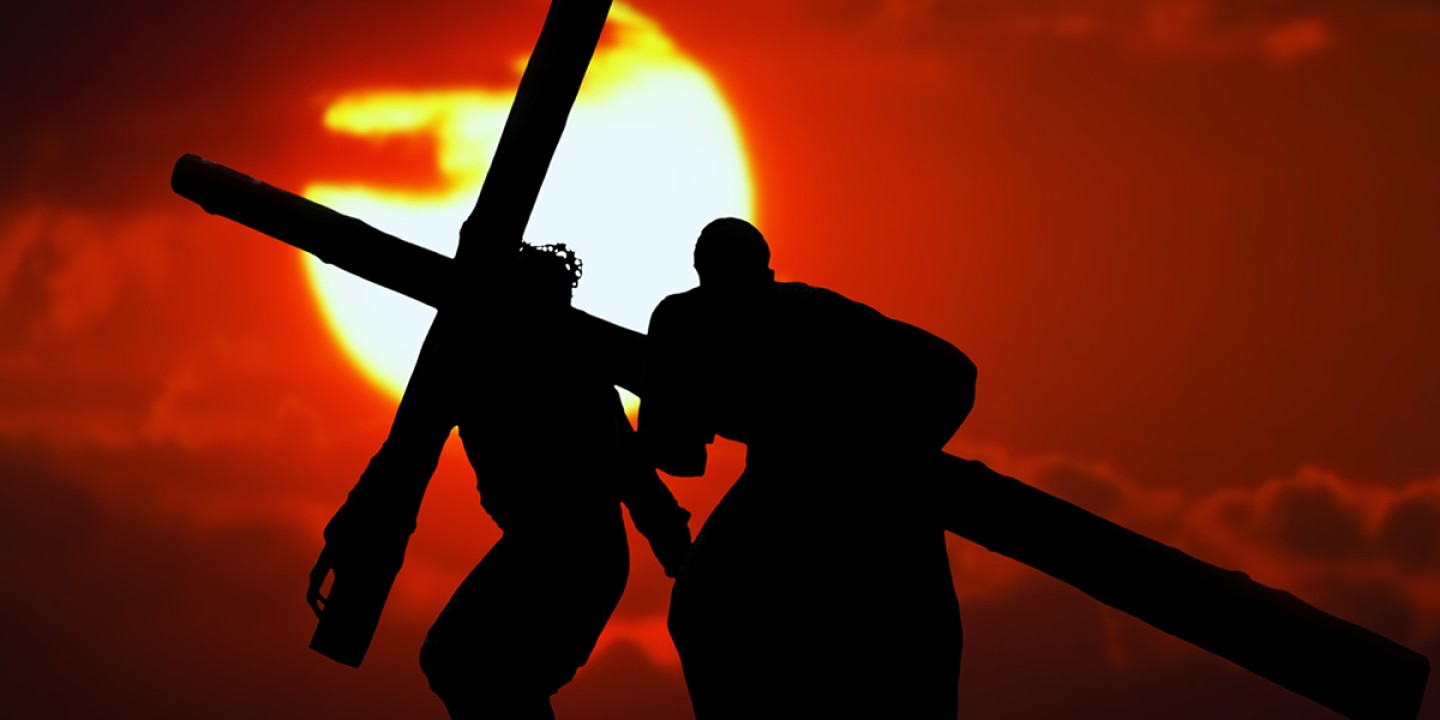
I admire people who take up crosses for the greater good. The surgeon who sacrifices a prestigious career to serve a backwater community. The gutsy journalist who risks her reputation to expose corruption close to home. The ordinary wage earner who donates every last penny to a cause he deems urgent.
But not all crosses are so shiny, salvific, and impressive. There are other kinds, too. Kinds we don’t choose, kinds that seemingly get us nowhere. As we move through a second Lenten season under the shadows of COVID-19, I’m thinking about crosses that make zero sense—crosses that baffle us from beginning to end.
Read our latest issue or browse back issues.
Simon of Cyrene encounters just such a cross. It’s hard not to ponder his place in the Passion story and ask, “What was the point?”
Simon shows up in the synoptic Gospels at history’s darkest hour. Jesus the Messiah has fallen, and the drama of Good Friday is at a tense standstill. The Roman soldiers whose job it is to execute him have tried forcing him upright, but it’s clear that Jesus can’t take another step on his own.
Enter Simon, a pilgrim from Africa, newly arrived in Jerusalem for the Passover. Simon is in town for devotional purposes; he wants no part in a criminal’s pain and scandal. But once he’s conscripted under Roman law, he has no choice but to obey orders.
It is possible that Simon experiences an epiphany along the path to Calvary. Maybe by the time he and Jesus make it to the top of the hill, Simon is a believer. But we don’t know; the Gospels offer us no platitudinous conversion story. It’s also possible that Simon cringes the entire time he bears the cross, avoids eye contact with Jesus throughout, and flees as soon as the soldiers release him.
The Gospel writers’ silence on the question of Simon’s heart leaves us room to imagine ourselves into the story. As I reflect on his grim encounter with Jesus, I wonder many things. Once the cross was hoisted onto his shoulders, what sort of spirit animated him? Was he consumed by the sheer injustice of his fate? Did the loudness of his Why me? and his How could God let this happen? fill the space inside his head? Or did he find room for compassion too?
I would love to say that every time I enter into another person’s suffering, I enter out of love. In reality I am often a reluctant crossbearer, motivated by fear, helplessness, or a frantic desire to get the unpleasant task over with as soon as possible.
This is why Simon’s place in the narrative is invaluable. He enters into Jesus’ story to save his own hide, not knowing how his one act—born of nothing particularly honorable—will ricochet over the years of his life or secure him a place in history.
It’s one thing to carry another person’s suffering in order to save them. But to help and not save? That offends my pride, my sense of order, my belief in fairness and justice. Something in me recoils.
Yet this is what we must do to avoid losing our humanity. We make meals for our neighbor whose cancer will definitely kill him. We send checks to our favorite charities, knowing that for every child our money temporarily feeds, there will be tens of thousands it won’t. We linger at the bedsides of loved ones afflicted with dementia, knowing full well that no matter how long we stay, they won’t remember who we are. We pray for an end to systemic injustice, or political corruption, or the crisis of climate change, or the wearying death tolls of the pandemic, and we understand that our prayers might not see fruition for months, years, decades, or centuries.
We do all of these things, and sometimes—maybe often—we’re haunted by the question I’ve ascribed to Simon: What was that for? What difference did it make?
It is not given to Simon to rescue the man whose burden he briefly shares. What he receives is a cross, and a cross isn’t something you solve—it’s something you carry. It isn’t even Simon’s privilege to know how the story will end. He has to walk away on that terrible Friday afternoon, totally ignorant of what Sunday might bring.
As I linger over this story, I find comfort in two things. First, Jesus doesn’t mind Simon’s reluctance. He needs help, and he takes what he can get. Simon enters into the appalling mess that is in front of him. He shoulders the weight and walks up the hill. That is enough.
Second, God knows—more agonizingly than we ever will—what it’s like to suffer and not save. It’s what God does a billion times a day, offering us companionship without negating our freedom. Simon matters because he stands in useful contrast to Jesus, who willingly walks with us in our suffering. Not for one day or one mile but for the duration.
An easy piety would argue that we have a choice to make: either we’ll allow the strain of our crosses to crack us apart, or we’ll allow suffering to change us for the better. I’m not a fan of easy piety, so I’ll argue this instead: life being the messy thing it is, we will choose both. Or we won’t choose both, but both will happen. We’ll crack apart, and we’ll be changed. We’ll bear our burdens resentfully, and we’ll bear them in love. The pain that enters into our lives will both deform us and transform us, over and over again. This is the road Simon walked. It’s the road we walk, accompanied by Jesus, until resurrection comes.
A version of this article appears in the print edition under the title “Crosses we don’t choose.”






